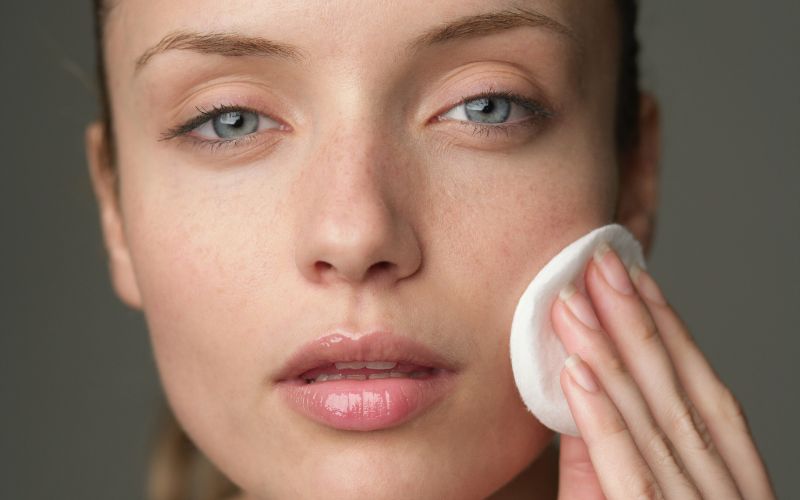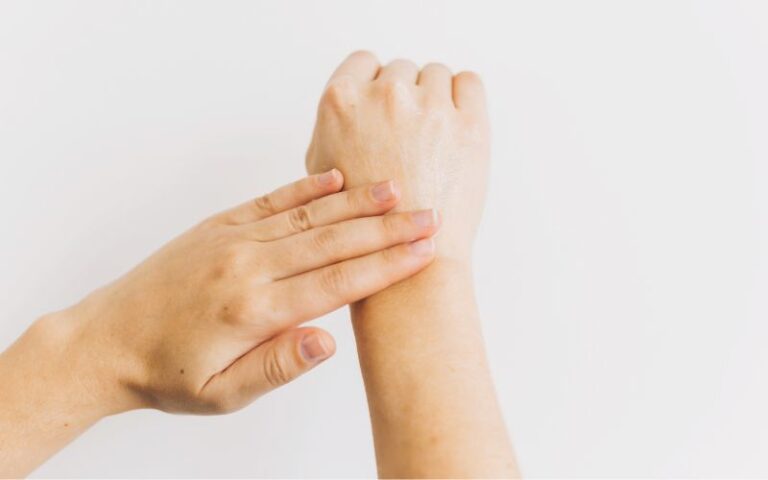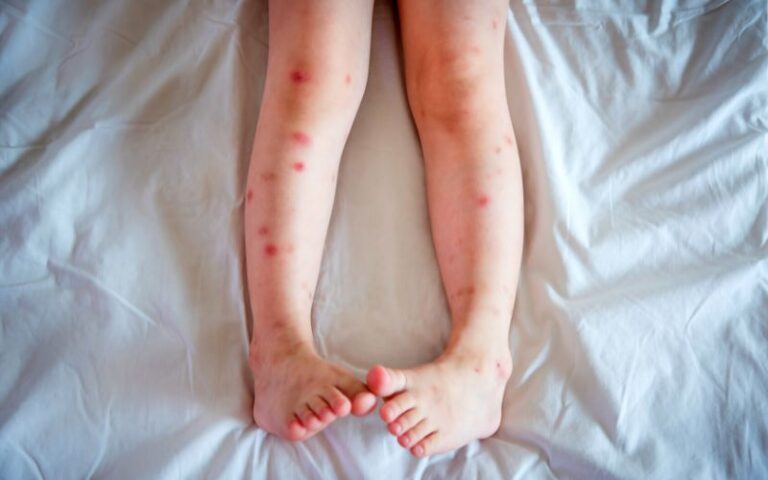Cracked Skin: 6 Myths And Facts

Cracked or extremely dry facial skin makes your makeup look unpleasant and leaves you with a flaky or cakey finish. Cracked heels and fingers are also unsightly and force you to cover your heel’s natural beauty.
So, why does this happen?
Your skin becomes dry or cracked when it lacks extra moisture, hydration, and care. Cracked skin could also be a warning of your underlying skin diseases.
However, people still believe in some myths that negatively impact cracked or severely dry skin. So we planned to throw some light on reality, and here’s what we prepared.
Common Cracked Skin Myths And Facts
Myth #1: Cracked skin is the result of cold weather.
Fact: It is an all-year-round issue. Factors like salt water, intensive UV rays, chlorine, and air conditioning flow can also dry your skin and make it crack.
Myth #2: Your skincare product’s fragrance has no role in cracked skin.
Fact: Chemicals like benzyl alcohol, acetone, linalool, ethanol, or ethyl acetate, used for fragrances in skin care products, irritate your dry skin and worsen it into cracked skin.
Myth #3: Your genes do not play a role in cracking skin
Facts: Studies show that gene mutations are vital in making your skin dry and cracked and developing eczema.
Myth #4: Hard water or soft water, nothing matters.
Fact: Hard water with a high concentration of magnesium and calcium creates a thin film on your skin and develops cracks by drying it up. It also reduces the penetration capability of your moisturizer.
Myth #5: Frequent handwash is good for hydrating your cracked skin
Fact: Soap, alcohol, and chemicals you use while hand washing removes the oil barrier and leave your skin porous, dry, and broken with redness, itching, and pain.
Myth #6: Stand under the steaming-hot water for an extended period to soothe your dry skin in winter.
Fact: Long and steaming showers or baths dry out the moisture in your skin and create cracks by increasing TEWL and erythema. So, use warm water and apply moisturizer within one minute of getting out of the shower.
Ok, now we know some common misconceptions about cracked skin. Now, let’s analyze the causes, symptoms, and treatments.
What Could lead to Skin Cracks?
Generally, lack of enough oil makes your skin lose this moisture and become dry. There are other reasons why you could get broken skin.
- Dry skin or Xerosis – Cold weather, chemicals in your skincare products, hot water showers, medicines, and exposing your skin to moisture for a long may make your skin dry. Here, the lack of care results in skin cracking.
- Keratolysis Exfoliativa – It causes peeling on your hands and feet. This peeling results in skin dryness and cracking.
- Psoriasis – With this disorder, your skin cells grow too fast in areas like the scalp, elbows, knees, and lower back. This sudden accumulation makes your skin appear scaly and cracked.
- Eczema – Eczema or atopic dermatitis affects your face, the inner arm folds, behind the knees, and arms and makes your skin appear dry and cracked.
- Athlete’s Foot – This fungal infection irritates your skin and makes it red, purple, gray, or white with scaly, cracked, or flaky skin.
- Habits – Frequent lip-licking and smoking habits may make your lips dry, irritated, and cracked.
- Diabetic Neuropathy – In this condition, your nervous system that controls sweating may fail. It affects moisture balance in your skin and makes it dry.
Symptoms Associated With Broken Skin
You can see the visible traces of cracks on your skin. Sometimes, your skin may show some symptoms to tell you that your skin is cracking.
They are :
- Skin discoloration
- Broken skin that bleeds
- Blisters
- Irritation with certain chemicals
- Dry lesions
- Bacterial or parasitic infections
- Itchiness
- Rashes
- White patches while scratching
- Rough skin texture
Why Is It Urgent to Treat Cracked Skin?
Mild cracks, even though they seem harmless, might affect your physical appearance and spoil your self-confidence.
If you leave your skin cracks careless for a long time, it may end up in severe complications. The cracks may become more profound and expose your skin’s inner layers to various irritations.
It could result in sepsis (the body’s extreme response to bacterial infections). To avoid all these risks, find the early signs of cracking skin and treat it with the proper treatments or a professional.
Treatment For Breaking Skin
If your case is severe, consulting your physician benefits you in many ways. They diagnose the cracks to find the actual cause and suggest appropriate medications for quick relief. Medications include corticosteroid creams, calcineurin inhibitors drugs, and UV light therapy for immediate relief.
If your cracks are mild, moisturization is the key. You can treat it quickly by
- moisturizing your skin twice a day
- avoiding harsh chemicals in skincare
- avoiding hot water shower
- protecting the skin from extreme cold and heat
- placing a humidifier in your room
- smoothening your heel with a pumice stone
- or altering your lifestyle.
You can also try simple natural remedies to comfort your cracked skin. Our guide on cracked heels and dry hands can help you know natural remedies.
When choosing a moisturizer, check the ingredients on the label and confirm they match your skin type and conditions.
Here are some ingredients you can look for to treat your broken skin.
- Jojoba Oil – The anti-inflammatory and healing properties relieve dryness, cracks, itching, flaking, and related symptoms.
- Lactic Acid – Gently exfoliates your skin and soothes the damaged and cracked skin.
- Hyaluronic Acid – Supercharges your skin with needed moisture.
- Dimethicone – The effective moisturizing ingredient provides long-lasting skin-smoothing benefits to knees, elbows, hands, and feet
- Glycerin – Protect the natural moisture in your skin and prevent over-drying and skin cracking
- Lanolin – The emollient and conditioning properties make it suitable for treating cracked lips and nipples.
- Mineral Oil – Creates a positive impact on your skin by helping it maintain its smoothness and health even in the winter.
Eventually
Cracked skin on your face, hands, foot, and knuckles forces you to cover your skin and refrain from wearing your favorite dresses. To come out of this bubble, give your skin what it needs as a first step. If you think it is not working, it is time to meet your dermatologist!
Reference
- How To Deal With Cracked Skin?: https://helpwomen.net/how-to-deal-with-cracked-skin/
- The Causes of Cracked Skin and the Best Ways to Treat It: https://www.healthline.com/health/skin/cracked-skin
- How to Diagnose and Treat Cracked Skin: https://www.verywellhealth.com/treating-cracked-skin-5191938
- Causes and treatments for cracked skin on hands and feet: https://www.medicalnewstoday.com/articles/cracked-skin
- CRACKED SKIN: SYMPTOMS, CAUSES, AND NATURAL SOLUTIONS: https://delfinaskin.com/blogs/news/cracked-skin-symptoms-causes-and-natural-treatments





